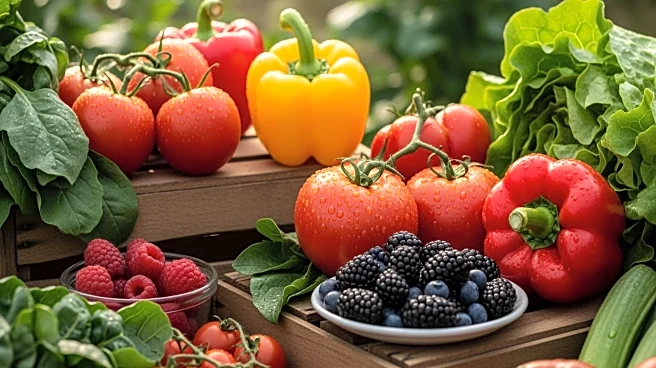What's Happening?
The U.S. organic farming market is anticipated to grow significantly, reaching $287.3 billion by 2032, according to a report by DataM Intelligence. This growth is driven by increasing consumer demand for
chemical-free foods, heightened health awareness, and food safety concerns. The market, which was valued at $171.5 billion in 2024, is expected to expand at a compound annual growth rate (CAGR) of 6.7% from 2025 to 2032. Factors contributing to this growth include supportive government policies, expanding retail availability, and premium pricing that encourages farmers to adopt organic practices. The Organic Trade Association reported that U.S. organic sales reached $71.6 billion in 2024, marking a 5.2% year-over-year increase. California has seen a surge in organic sales, with new initiatives aiming to transition 10% of cropland to organic by 2030.
Why It's Important?
The expansion of the organic farming market reflects a broader shift towards sustainable agriculture practices in the U.S. This growth is significant for the agricultural industry as it aligns with increasing consumer preferences for healthier and environmentally friendly food options. The rise in organic farming supports biodiversity, reduces soil degradation, and minimizes water pollution, contributing to overall environmental sustainability. Additionally, the market's growth is likely to influence policy decisions, encouraging further governmental support and subsidies for organic farming. As consumer demand for organic products continues to rise, farmers and businesses involved in organic agriculture stand to benefit from increased market opportunities and profitability.
What's Next?
The organic farming sector is expected to continue its growth trajectory, driven by ongoing consumer demand and supportive policies. The U.S. government may introduce more initiatives to promote organic farming practices, potentially increasing subsidies and support for farmers transitioning to organic methods. The market could also see advancements in organic farming technologies and techniques, improving crop yields and operational efficiency. As the sector expands, there may be increased scrutiny on organic imports to ensure integrity and compliance with standards, potentially leading to tighter regulations and oversight.












